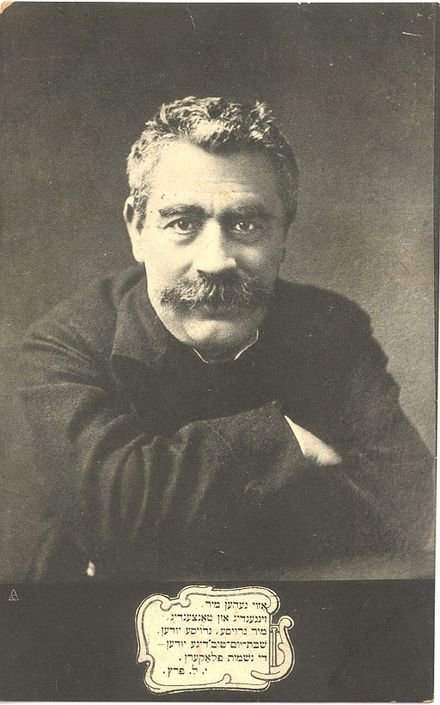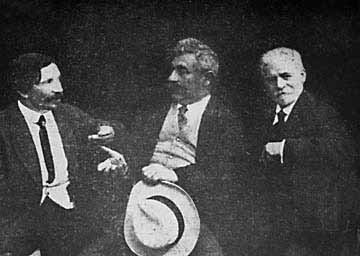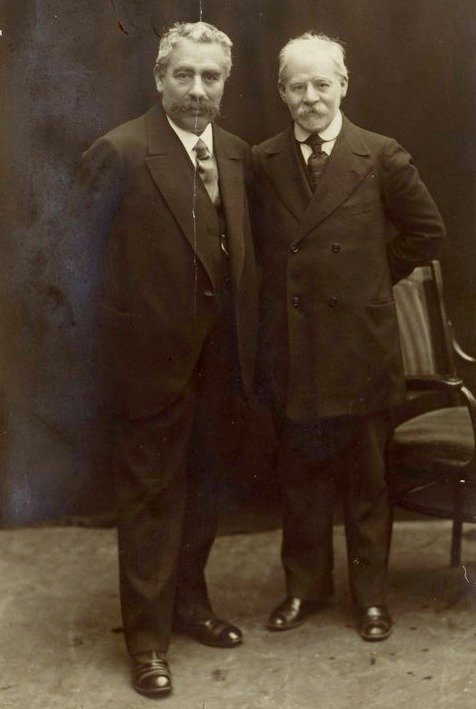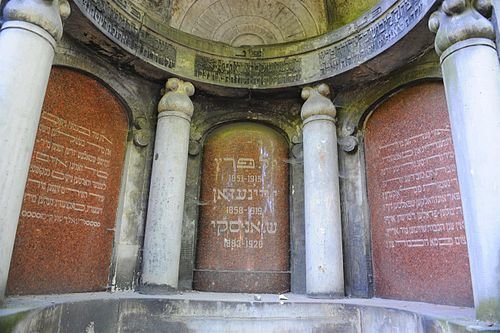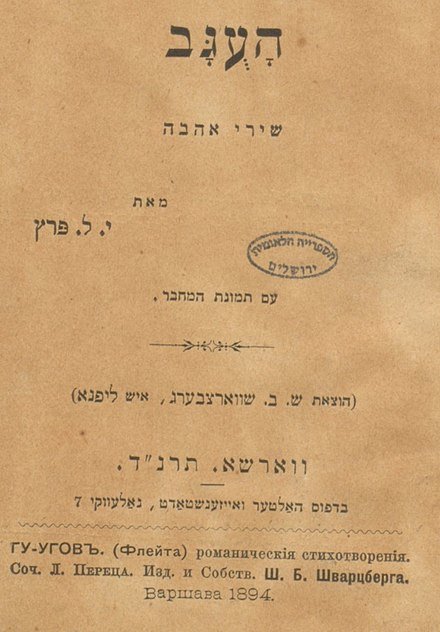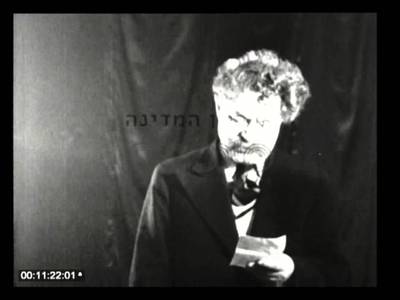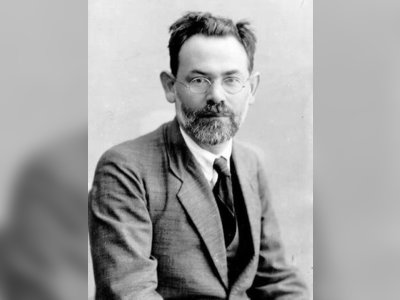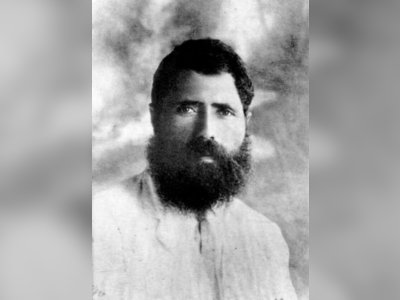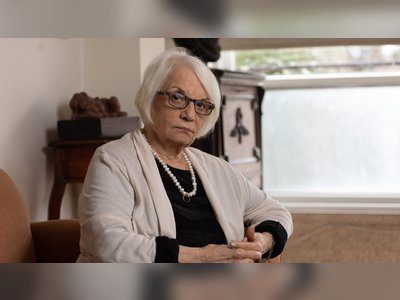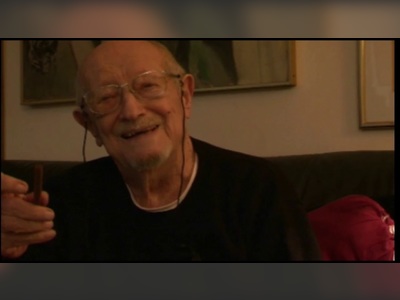מורשת גדולי האומה
בזכותם קיים
beta
Isaac Leib Peretz
Commonly known by his initials I.L. Peretz, was a prominent writer in Yiddish and Hebrew and one of the fathers of the Jewish cultural revival during the late 19th and early 20th centuries.
Peretz vividly portrayed the lives of the Jewish community in Eastern Europe, empathizing with the struggles of the common people. He wrote positively about the Chassidic movement, which, during his time, faced criticism from both secular Jewish intellectuals and traditional religious factions.
While most of Peretz's works consist of short stories, he also ventured into poetry, longer narratives like "The Destruction of the House of the Righteous" (originally "Di Goldene Kait" - "The Golden Chain"), plays, translations (mostly from Yiddish to Hebrew), and engaged in teaching and encouraging young Yiddish writers.
Peretz was born in Zamosc, in Congress Poland, to a traditional Jewish family. He received some education in religious studies but developed an autodidactic approach to secular learning, without formal schooling. In Zamosc, there was a positive attitude towards secular education, and a group of writers and intellectuals formed in the early 19th century. Peretz later described himself, saying, "They used to say I was a genius, a sharp mind, and a wandering soul." Yosef Klausner noted that this was a defining characteristic of his writing, combining logical thought with emotional depth. He also learned multiple languages, enabling him to engage with general literature.
In 1870 or 1871, his parents arranged a marriage to Sara, the daughter of the Hebrew scholar and writer Gabriel Judah Lichtenfeld, and they had two children.
Initially, they lived with his in-laws as was customary for young couples at the time, but when he couldn't secure a steady income, he moved back to Zamosc and married Helena Ringelheim in 1878. During this period, aside from letters to his wife, he wrote very little.
After about a decade, Peretz returned to the literary scene and also became socially active. In 1886, he published a collection of poems and stories in both Yiddish and Hebrew. His stories contained societal critique, especially focusing on the Jewish community's issues. Shortly after, he began writing in Yiddish, establishing and managing "Shalom Aleichem," a Yiddish literary journal, to promote Yiddish literature. His works often incorporated Jewish literary traditions and social and radical themes, quickly earning him a reputation within the Jewish community.
Simultaneously, he studied law and earned a degree in 1876, but due to his socialist views, his license was revoked. In 1891, he moved to Warsaw to live in a larger literary center. There, he worked for the community, primarily in the cemetery department, which provided him a steady income until his death.
I.L. Peretz was admired and respected as a writer, and his funeral saw an attendance of 100,000 people. He is buried in the Jewish cemetery in Warsaw, alongside his fellow classics of Yiddish literature, Mendele Mocher Sforim and Sholem Aleichem.
Peretz left a lasting legacy as a talented bilingual writer. His earlier work was influenced by European literary movements such as Romanticism, Symbolism, and even Nietzschean motifs. He started as a latecomer to secular education, which imbued his writing with a distinctive Romantic quality, often drawing from Chassidic and folkloric sources. His stories celebrated the Chassidic movement and the simple Jewish folk.
As a bilingual writer, I.L. Peretz bridged the gap between the traditional and the modern, emphasizing the importance of both enlightenment and traditional values. This fusion of modernity and tradition is a hallmark of his work.
In his final years, he primarily wrote in Hebrew and dedicated himself to translating many of his Yiddish works into Hebrew. His heartfelt concern for the fate of Jews during World War I and the turmoil in Poland deeply affected him. He spent much of his last year raising funds and writing appeals for Jewish refugees.
In conclusion, Isaac Leib Peretz, or I.L. Peretz, was a versatile and influential writer who captured the essence of Jewish life in Eastern Europe during a period of great social and cultural change. His ability to blend traditional Jewish values with modern thought and his deep empathy for the common people made him a cherished figure in Jewish literature. His legacy endures as a bridge between the past and the future of Jewish culture and literature.
While most of Peretz's works consist of short stories, he also ventured into poetry, longer narratives like "The Destruction of the House of the Righteous" (originally "Di Goldene Kait" - "The Golden Chain"), plays, translations (mostly from Yiddish to Hebrew), and engaged in teaching and encouraging young Yiddish writers.
Biography:
Peretz was born in Zamosc, in Congress Poland, to a traditional Jewish family. He received some education in religious studies but developed an autodidactic approach to secular learning, without formal schooling. In Zamosc, there was a positive attitude towards secular education, and a group of writers and intellectuals formed in the early 19th century. Peretz later described himself, saying, "They used to say I was a genius, a sharp mind, and a wandering soul." Yosef Klausner noted that this was a defining characteristic of his writing, combining logical thought with emotional depth. He also learned multiple languages, enabling him to engage with general literature.
In 1870 or 1871, his parents arranged a marriage to Sara, the daughter of the Hebrew scholar and writer Gabriel Judah Lichtenfeld, and they had two children.
Initially, they lived with his in-laws as was customary for young couples at the time, but when he couldn't secure a steady income, he moved back to Zamosc and married Helena Ringelheim in 1878. During this period, aside from letters to his wife, he wrote very little.
After about a decade, Peretz returned to the literary scene and also became socially active. In 1886, he published a collection of poems and stories in both Yiddish and Hebrew. His stories contained societal critique, especially focusing on the Jewish community's issues. Shortly after, he began writing in Yiddish, establishing and managing "Shalom Aleichem," a Yiddish literary journal, to promote Yiddish literature. His works often incorporated Jewish literary traditions and social and radical themes, quickly earning him a reputation within the Jewish community.
Simultaneously, he studied law and earned a degree in 1876, but due to his socialist views, his license was revoked. In 1891, he moved to Warsaw to live in a larger literary center. There, he worked for the community, primarily in the cemetery department, which provided him a steady income until his death.
I.L. Peretz was admired and respected as a writer, and his funeral saw an attendance of 100,000 people. He is buried in the Jewish cemetery in Warsaw, alongside his fellow classics of Yiddish literature, Mendele Mocher Sforim and Sholem Aleichem.
Legacy:
Peretz left a lasting legacy as a talented bilingual writer. His earlier work was influenced by European literary movements such as Romanticism, Symbolism, and even Nietzschean motifs. He started as a latecomer to secular education, which imbued his writing with a distinctive Romantic quality, often drawing from Chassidic and folkloric sources. His stories celebrated the Chassidic movement and the simple Jewish folk.
As a bilingual writer, I.L. Peretz bridged the gap between the traditional and the modern, emphasizing the importance of both enlightenment and traditional values. This fusion of modernity and tradition is a hallmark of his work.
In his final years, he primarily wrote in Hebrew and dedicated himself to translating many of his Yiddish works into Hebrew. His heartfelt concern for the fate of Jews during World War I and the turmoil in Poland deeply affected him. He spent much of his last year raising funds and writing appeals for Jewish refugees.
In conclusion, Isaac Leib Peretz, or I.L. Peretz, was a versatile and influential writer who captured the essence of Jewish life in Eastern Europe during a period of great social and cultural change. His ability to blend traditional Jewish values with modern thought and his deep empathy for the common people made him a cherished figure in Jewish literature. His legacy endures as a bridge between the past and the future of Jewish culture and literature.
- י"ל פרץhe.wikipedia.org
